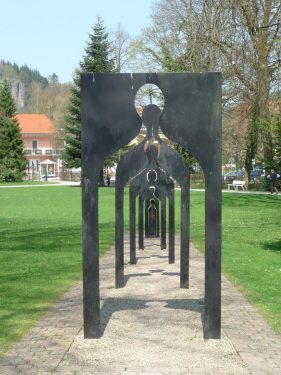Article and photo by Peter Koeppel, member of Trinity Memorial Church in Binghamton and the diocesan Stewardship Resources team.

From author Peter Koeppel: I encountered the above sculpture a few years back in a small town in Germany’s northern Black Forest; a small plaque explains that it represents the concept of, for any decision, thinking through seven generations worth of impact, attributed to the native peoples of North America.
Vulcan canon states that “the needs of the many outweigh the needs of the few.” Western humanity seems to have taken a different view.
Let’s step back: what do you know about the world in which your great-great-great-great-great-grandparents lived? If you lost track of the “greats,” that would be your parents’ grandparents’ grandparents, I think: seven generations before your own. I have no personal accounts of the living circumstances of my own ancestors that far back; we do know that many of them were Lutheran ministers in small, rural parishes. Others we know of sold Silesian lace. What little we know about their lives suggests their lives were hard and they were none too comfortable; just daily living (survival?) was hard work: accessing food and water, staying warm in the winter, transportation… none of it came easy.
Could they have anticipated the lifestyle we enjoy today? Not in their wildest dreams. My own great-great-great-great-great-grandparents were born in the midst of the industrial revolution (about 1790) and certainly experienced a way of life very different from that of their ancestors. And how wildly different is our world from what theirs became: instead of in factories we work in offices; instead of producing tangible things, we buy and sell them, and we provide services; water and food are available at a flick of a faucet, or the opening of a refrigerator; heating (and maybe cooling) is available with a nudge of a thermostat setting; transportation waits for us just a short few steps away in the garage or driveway. While the Wright brothers’ flights were another 100 years away from the time of these ancestors, today we barely spare a thought to stepping on an airplane. Anything electronic was simply beyond even the wildest imagination.
Yet, if we look at this time span, and our challenges with its results, we have roughly one generation’s worth of time left (between now and roughly 2050) to limit the impacts which those seven prior generations have had on God’s creation. Are we developing a sense of urgency yet?
There’s no time to lose. As we embark on making the changes required to limit further damage, we need to realize that not everything we try will work on the first try, and some things will work never. That’s ok—occasional failures in our attempts to restore a stable balance to God’s creation are to be expected. That, though, is not an excuse not to apply ourselves to this task. This is truly our task, and pushing it onto the next generation is nothing short of an abdication of our responsibility.
Compare the relentless push of the seven generations of our ancestors with a decision practice attributed to the indigenous peoples of the North American continent: “In any decision, consider its impact on seven generations hence.” This considerate, even humble practice—represented by the sculpture pictured above—stands in stark contrast to the self-focused drive behind the industrial revolution, and the societal and economic transformations Western people have driven since. Where might we be if our ancestors, all the way some seven generations back, had acted in greater harmony with God’s creation? Where might we be if we remembered that our dominion over God’s creation does not set us apart from it, but makes us be among the victims of whatever our ancestors, and us, did to it? What are we prepared to do if we look at our obligation to keep this fragile, beautiful earth home of ours livable for seven generations hence?
The fictional Vulcans are just that—fictional. We, on the other hand, have to deal with reality, a good bit of which we established by tweaking God’s creation. As we now do our best to deal with the reality which the seven generations prior to us have created, the local native peoples may have to teach us something about patience and prudence in decision making that we, as Western Christians, might be well-advised to consider and integrate into our own thinking. With God’s help, we will!



I wholeheartedly agree with your perspective on our current environmental crisis, and our responsibility for it. My hope is that the church and other faith organizations cooperate in recognizing this responsibility and also our need to care for each other and the rest of life on our planet. To do less is to ignore Jesus’ command to love God and neighbor.